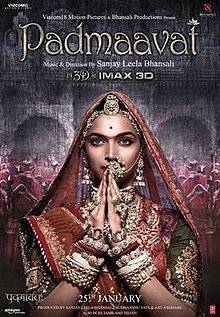"A Clash of Power and False Religions Is at the Heart of This Action-Packed Bollywood Drama"

| None | Light | Moderate | Heavy | |
|---|---|---|---|---|
| Language | ||||
| Violence | ||||
| Sex | ||||
| Nudity |
What You Need To Know:
Viewers will feel like they’re transported to medieval India with PADMAAVAT’s lush cinematography, high production values, background music, costumes, and customs. The movie has a resemblance to the biblical story of Queen Esther, who risks her life to save Israel. Padmavati makes a similar decision. That said, the movie promotes a false Hindu, Islamic worldview, with pervasive violence, some sexual situations, greed, revenge, abuse of power, and suicide. In fact, a suicide solves the plot problem, though the suicide is partly a response to avoid Muslim cruelty. In more ways than one, PADMAAVAT is an unacceptable movie according to objective biblical standards.
Content:
More Detail:
PADMAAVAT is a Bollywood movie from India based on an epic 16th Century Hindu poem, a classic story of a Muslim king battling for power by stealing the beloved wife of a Hindu king and waging war. Stunning computer-generated effects and backdrops deliver a beautiful Indian setting in PADMAAVAT, but the movie is unacceptable entertainment because of its Islamic, Hindu worldview and scenes featuring pervasive violence, some sexual situations, greed, revenge, abuse of power, and suicide.
Queen Padmavati, beloved wife of a Hindu king named Ratan Singh, rules the kingdom of Chittor, located northwest of India. Set in 13th Century Afghanistan, the Sultan of Delhi sends his nephew Alauddin to give his daughter an ostrich as a birthday gift, but he in return takes the Sultan’s daughter as his wife as well as the Sultan’s throne.
In Singhal, lives the Princess named Padmavati. She finds King Rattan Singh of Mewar hunting for pearls and accidentally wounds him by hitting him the chest with an arrow. The Princess searches for him and cares for him. Thy instantly fall in love. With her father, King Gandharvsen’s blessing, they marry, and she moves with him to Chittor.
After she moves with the King, Alauddin revolts against the Delhi Sultanate and establishes the Khilji dynasty, declaring himself the Sultan of Delhi. Fearing a revolt, the Sultan of Delhi offered Alauddin a slave, Malik Kafur, who kills the Sultan and his men. Filled with greed and ambition with his new position as Sultan of Delhi, Alauddin sets his sights on his destiny, taking Padmavati to be his wife.
Declaring war on the Rajputs of Chittor, Alauddin’s Kilji warriors plunder their neighbors, cut off their supply of food and water, and weaken their defenses. Unable to weaken the Rajput army, however, Alauddin devises a plan to offer a truce. Malik, the slave, goes to King Ratan Singh and says Alauddin wants to meet with him and experience their hospitality. Ratan Signh accepts, with two conditions. Alauddin’s army must return to Delhi, and he must come alone and unarmed to their meeting, which he accepts.
Alauddin asks to see Padmavarti, and the Hindu King shows her to him on the other side of a curtain. When King Singh and Alauddin meet once again, Alauddin captures Singh and throws him into jail, using him as bait to lure Padmavati to Delhi. Despite the people’s protests, Padmavati meets with Alauddin, under the conditions that she meet with the King first and then meets with Alauddin after King Singh is released and Alauddin beheads one of his own to her, which he does. The King is released, and Padmavati and King Signh return to Chittor.
[SPOILERS FOLLOW] In one last effort to achieve domination, Alauddin strikes the fort at Chittor, forcing both King and Sultan to duke it out in one last battle. Alauddin kills King Signh. In response, Padmavati performs Jauhar, the act of committing suicide by burning her body. This act is Alauddin’s greatest defeat and Chittor’s greatest victory, leaving behind a centuries’ long legacy of valor and sacrifice.
Set in India in 1303 medieval India, this retelling of the poem Padmaavat in movie format stays true to the rituals and customs of that culture. Stunning computer-generated effects and backdrops deliver a beautiful Indian setting. References to Hinduism and Islam are carried through dialogue, costume, plotline, and other production elements. Actors deliver great performances, and Padmavati is portrayed as a strong female character. They also display their singing talents singing several songs throughout the movie. The songs actually enhance the audience’s viewing experience.
Ultimately, PADMAAVAT is a clash of power and false religions, specifically Muslim versus Hindu. Several scenes of beheadings, sexual content and other immorality such as greed and disregard for the sanctity of life and women add to this violent movie’s inappropriate content. In fact, a suicide solves the plot problem, though the suicide can be seen as partly a response to avoid Muslim cruelty and enslavement. In more ways than one, therefore, PADMAAVAT is unacceptable movie entertainment according to MOVIEGUIDE®’s objective biblical standards.



 - Content:
- Content: 

 - Content:
- Content: 
